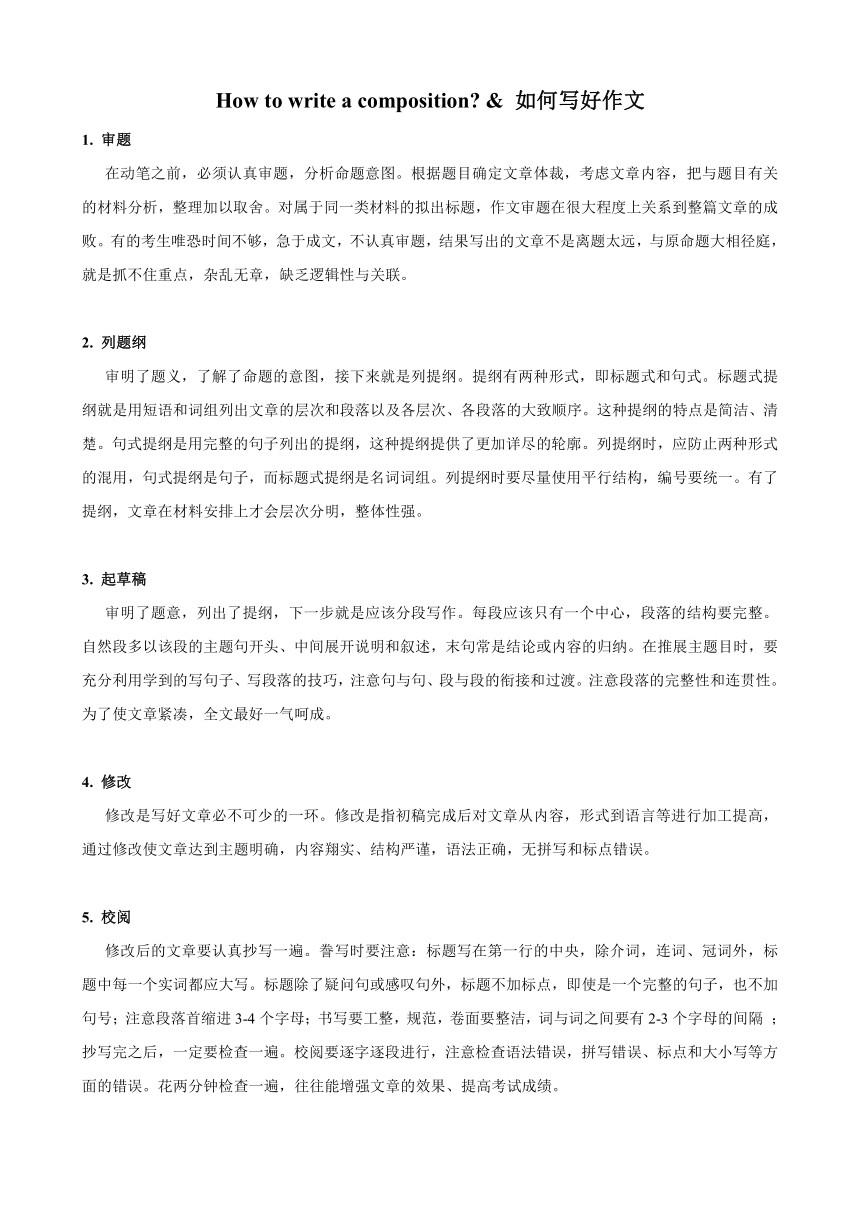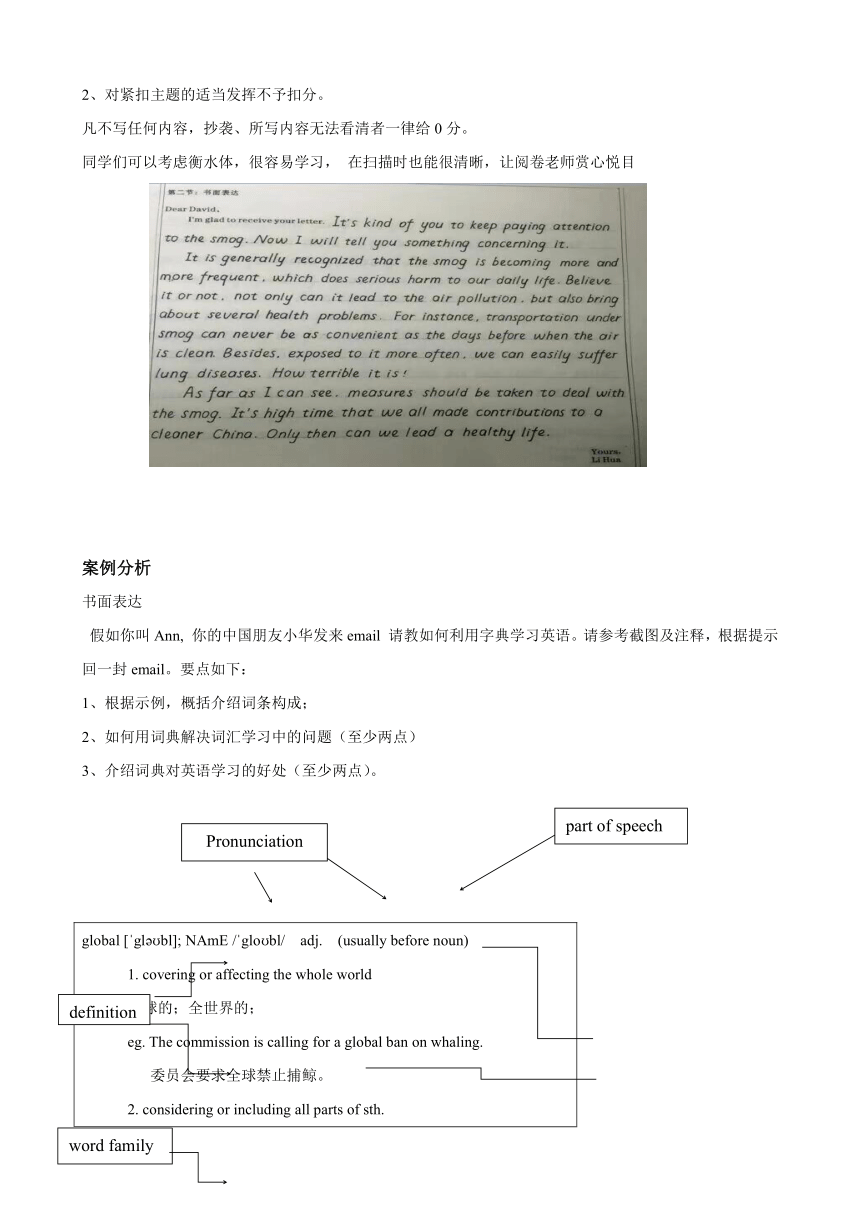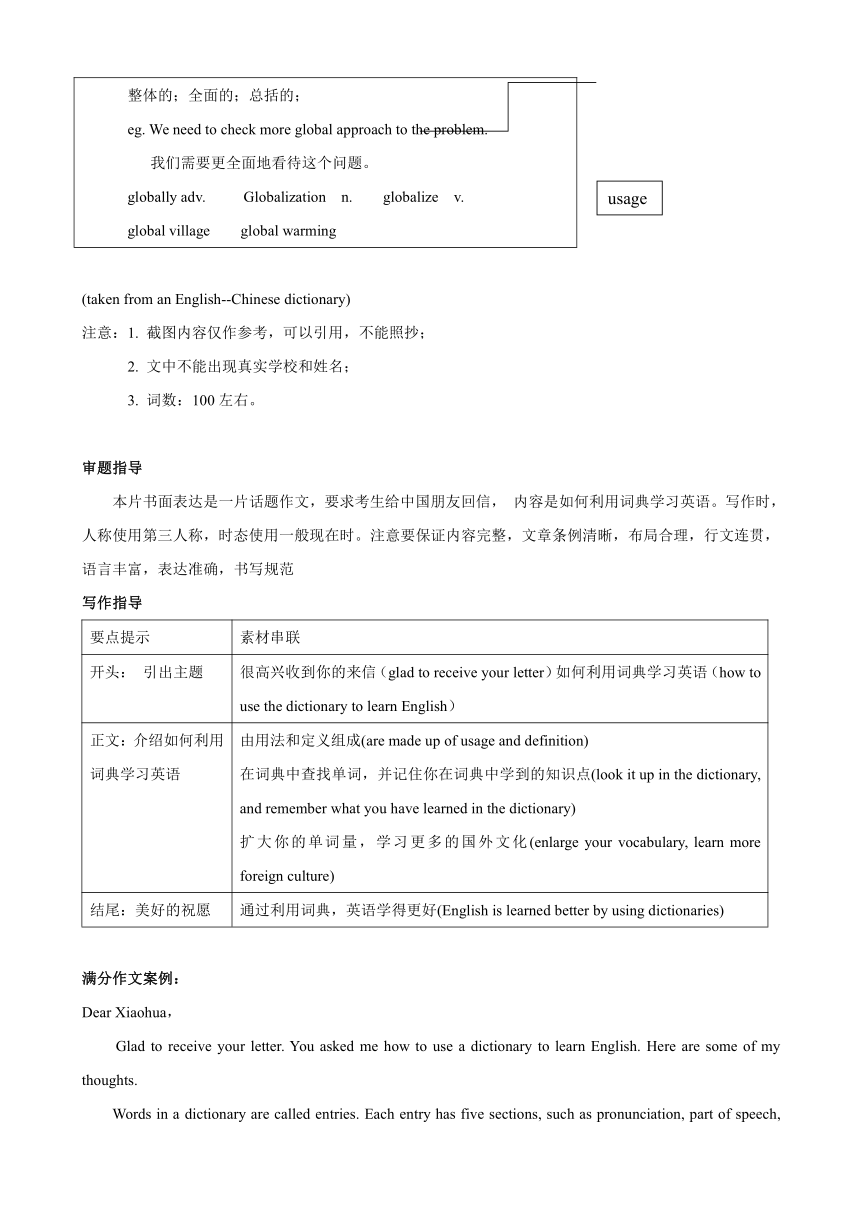2025年中考英语如何提升英语作文水平练习(无答案)
文档属性
| 名称 | 2025年中考英语如何提升英语作文水平练习(无答案) |  | |
| 格式 | docx | ||
| 文件大小 | 244.4KB | ||
| 资源类型 | 教案 | ||
| 版本资源 | 人教新目标(Go for it)版 | ||
| 科目 | 英语 | ||
| 更新时间 | 2024-10-26 19:29:04 | ||
图片预览




文档简介
How to write a composition & 如何写好作文
1. 审题
在动笔之前,必须认真审题,分析命题意图。根据题目确定文章体裁,考虑文章内容,把与题目有关的材料分析,整理加以取舍。对属于同一类材料的拟出标题,作文审题在很大程度上关系到整篇文章的成败。有的考生唯恐时间不够,急于成文,不认真审题,结果写出的文章不是离题太远,与原命题大相径庭,就是抓不住重点,杂乱无章,缺乏逻辑性与关联。
2. 列题纲
审明了题义,了解了命题的意图,接下来就是列提纲。提纲有两种形式,即标题式和句式。标题式提纲就是用短语和词组列出文章的层次和段落以及各层次、各段落的大致顺序。这种提纲的特点是简洁、清楚。句式提纲是用完整的句子列出的提纲,这种提纲提供了更加详尽的轮廓。列提纲时,应防止两种形式的混用,句式提纲是句子,而标题式提纲是名词词组。列提纲时要尽量使用平行结构,编号要统一。有了提纲,文章在材料安排上才会层次分明,整体性强。
3. 起草稿
审明了题意,列出了提纲,下一步就是应该分段写作。每段应该只有一个中心,段落的结构要完整。自然段多以该段的主题句开头、中间展开说明和叙述,末句常是结论或内容的归纳。在推展主题目时,要充分利用学到的写句子、写段落的技巧,注意句与句、段与段的衔接和过渡。注意段落的完整性和连贯性。为了使文章紧凑,全文最好一气呵成。
4. 修改
修改是写好文章必不可少的一环。修改是指初稿完成后对文章从内容,形式到语言等进行加工提高,通过修改使文章达到主题明确,内容翔实、结构严谨,语法正确,无拼写和标点错误。
5. 校阅
修改后的文章要认真抄写一遍。誊写时要注意:标题写在第一行的中央,除介词,连词、冠词外,标题中每一个实词都应大写。标题除了疑问句或感叹句外,标题不加标点,即使是一个完整的句子,也不加句号;注意段落首缩进3-4个字母;书写要工整,规范,卷面要整洁,词与词之间要有2-3个字母的间隔 ;抄写完之后,一定要检查一遍。校阅要逐字逐段进行,注意检查语法错误,拼写错误、标点和大小写等方面的错误。花两分钟检查一遍,往往能增强文章的效果、提高考试成绩。
评分要点
一篇好的英文作文一定要做到以下几点:
1.要点全面、表达准确、语句连贯,符合交际要求。
2.能用书写体熟练清楚地书写且无太多的拼写错误。
3.书写格式、行文及知识点的使用等无严重错误。
4.基本语法和常用句型无严重错误,意思表达清楚。
5.恰当使用复杂结构、高级词汇和顺畅连接。
英语作文评分标准
评分原则:
1. 总分15分,按5个档次给分。中档属于第三档(7-9分)。
2. 评分时,先跟据文章的内容和语言初步确定其所属档次,然后以该档次的要求来衡量,确定或调整档次,最后给分。
3. 总词数不足的,可在本题总得分中扣去1分。
4. 评分时应注意的主要内容为:内容要点、应用词汇和语法结构的数量和正确性、上下文的连贯性及语言的得体性。各要素的权重大体为:卷面书写(1分),内容9分(其中要点5分,语意连贯4分),语法结构、单词拼写、标点(4分),词数(1分)。
5. 拼写与标点符号是语言正确性的一个方面,评分时应视其对交际的影响程度予以考虑。
【各档次的给分范围和要求】
第一档(13-15分):写出全部内容要点,语句流畅。基本无语法和词汇方面的错误,少数错误主要是由于较高级词汇或复杂结构所致。词数达到要求。基本无单词拼写及标点错误。
第二档(10-12分):写出大部分要点类容。语句较流畅。有少量语法和词汇方面的错误,但不影响理解。有少量单词拼写及标点错误。
第三档(7-9分):写出部分要点。语句基本通顺。有一些语法和词汇错误,有少量单词及标点错误。
第四档(4-6分):写出少量内容要点,语句不通顺。语法、词汇、单词拼写、标点错误较多。只有少量句子表达正确。
第五档(0-3分):基本上没有写出内容要点,语法、词汇、单词拼写错误较多。基本上没有通顺的句子。只写出一些单词,不知所云。
【说明】
1、要点可用不同方式表达。
2、对紧扣主题的适当发挥不予扣分。
凡不写任何内容,抄袭、所写内容无法看清者一律给0分。
同学们可以考虑衡水体,很容易学习, 在扫描时也能很清晰,让阅卷老师赏心悦目
案例分析
书面表达
假如你叫Ann, 你的中国朋友小华发来email 请教如何利用字典学习英语。请参考截图及注释,根据提示回一封email。要点如下:
1、根据示例,概括介绍词条构成;
2、如何用词典解决词汇学习中的问题(至少两点)
3、介绍词典对英语学习的好处(至少两点)。
(
part of speech
)
(
Pronunciation
)
(
word family
) (
definition
)
global [ gl bl]; NAmE / glo bl/ adj. (usually before noun) 1. covering or affecting the whole world 全球的;全世界的; eg. The commission is calling for a global ban on whaling. 委员会要求全球禁止捕鲸。 2. considering or including all parts of sth. 整体的;全面的;总括的; eg. We need to check more global approach to the problem. 我们需要更全面地看待这个问题。 globally adv. Globalization n. globalize v. global village global warming
(
usage
)
(taken from an English--Chinese dictionary)
注意:1. 截图内容仅作参考,可以引用,不能照抄;
2. 文中不能出现真实学校和姓名;
3. 词数:100左右。
审题指导
本片书面表达是一片话题作文,要求考生给中国朋友回信, 内容是如何利用词典学习英语。写作时,人称使用第三人称,时态使用一般现在时。注意要保证内容完整,文章条例清晰,布局合理,行文连贯,语言丰富,表达准确,书写规范
写作指导
要点提示 素材串联
开头: 引出主题 很高兴收到你的来信(glad to receive your letter)如何利用词典学习英语(how to use the dictionary to learn English)
正文:介绍如何利用词典学习英语 由用法和定义组成(are made up of usage and definition) 在词典中查找单词,并记住你在词典中学到的知识点(look it up in the dictionary, and remember what you have learned in the dictionary) 扩大你的单词量,学习更多的国外文化(enlarge your vocabulary, learn more foreign culture)
结尾:美好的祝愿 通过利用词典,英语学得更好(English is learned better by using dictionaries)
满分作文案例:
Dear Xiaohua,
Glad to receive your letter. You asked me how to use a dictionary to learn English. Here are some of my thoughts.
Words in a dictionary are called entries. Each entry has five sections, such as pronunciation, part of speech, definition, usage and word group. Of course, sometimes the same word has different parts of speech and definitions.
Using dictionaries can solve problems in vocabulary learning. When we meet a new word, with the help of a dictionary, we can not only find out its pronunciation, but also know its meaning. A dictionary is of great benefit to English learning. First of all, it can help us understand the meaning of words accurately. Secondly, it can enrich our knowledge and exercise our thinking. Finally, it can help us learn to express our ideas.
I hope it's helpful to you.
Yours
Ann
实 战 演 练
五、书面表达。(计15分)
常怀感恩之心,懂得感恩他人,会使你和身边的人更有爱、更快乐、更幸福。美好的初中生活即将结束,你想用什么样的
方式感谢你的父母、老师、同学 你的学校将会在期末考试结東后举行一次“1 earn to Be Thankf"”的主题演讲比赛,请根据
以下思维导图,写一篇英语演讲稿。
要求:1.内容包括所有要点,语句通顺,层次清晰,意思连贯;
2.词数:90左右;
3.不能出现自己的真实姓名和学校相关信息。
Treasure life although he's also under studying pressure
A No pressure, no diamonds
Learn to Be Thankful
______________________________________________________________________________________
______________________________________________________________________________________
______________________________________________________________________________________
______________________________________________________________________________________
______________________________________________________________________________________
______________________________________________________________________________________
______________________________________________________________________________________
______________________________________________________________________________________
______________________________________________________________________________________
Homework
一、完形填空。
A
Jin Yong(pen name of Zha Liangyong), a famous person, 1 on October 30th in Hong Kong, at the age of 94.
Zha was born in 1924, in Zhejiang. He moved to Hong Kong in 1948. He was one of the most leading modem Chinese-language 2 .
Zha was most famous for his kung fu, and he wrote 15 popular kung fu novels between 1955 and 1972, such as emi Gods and Sem Denil (天龙八部), The Legend of the Condor Heroes (《射雕英雄传》). Duke of Mount Deert (《鹿鼎记》) was the last kung fu novel. Over 300 million copies of his works 3 in the Chinese-speaking areas, including Mainland China, Hong Kong, Taiwan and Southeast Asia.
His novels have been changed into movies, TV plays, radio dramas, comic books, greatly influenced the 4 development of Chinese-speaking countries around the world. Zha’s works have been translated into Korean, English, Japanese, French, Thai and so on. He had many fans 5 as well.
( ) 1. A succeeded B. died C interviewed
( ) 2. A doctors B. singers C. writers
( ) 3. A have been sold B. will be sold C had been sold
( ) 4. A educational B. historical C cultural
( ) 5. A in China B. abroad C in Japan
B
One winter afternoon, I was working at the community office when a woman came in, wearing only a dirty shirt. She started 6 after she sat on a sofa. Clearly, she wasn't well.
Without thinking too much, I picked out some of my old but 7 clothes. Just then a workmate of mine told me that I shouldn’t 8 the woman, because it would only make her want more help from other. But I 9 doing what I was doing.
Two weeks later, an old man came to my 10 . He told me that he knew I had helped a sick woman there and that was 11 he wanted to give me ¥1.000! 12 needed the money at that time. But I never thought about getting something in return.
Two years later, the old man called me 13 told me he wanted to invite my family to take holidays in Hainan! I asked him why and he said it was giver. 14 was just because I helped a sick woman without thinking.
Although you only want to be a giver, 15 is actually receiving
( ) 6. A. laughing B. coughing C. drinking
( ) 7. A. clean B. dirty C. traditional
( ) 8. A. meet B. refuse C. help
( ) 9. A. hated B. stopped C. continued
( ) 10. A. office B. school C. club
( ) 11. A. when B. why C. how
( ) 12. A. really B. possibly C. mainly
( ) 13. A. but B. so C. and
( ) 14. A. None B. All C. Neither
( ) 15. A. requesting B. giving C. raising
1. 审题
在动笔之前,必须认真审题,分析命题意图。根据题目确定文章体裁,考虑文章内容,把与题目有关的材料分析,整理加以取舍。对属于同一类材料的拟出标题,作文审题在很大程度上关系到整篇文章的成败。有的考生唯恐时间不够,急于成文,不认真审题,结果写出的文章不是离题太远,与原命题大相径庭,就是抓不住重点,杂乱无章,缺乏逻辑性与关联。
2. 列题纲
审明了题义,了解了命题的意图,接下来就是列提纲。提纲有两种形式,即标题式和句式。标题式提纲就是用短语和词组列出文章的层次和段落以及各层次、各段落的大致顺序。这种提纲的特点是简洁、清楚。句式提纲是用完整的句子列出的提纲,这种提纲提供了更加详尽的轮廓。列提纲时,应防止两种形式的混用,句式提纲是句子,而标题式提纲是名词词组。列提纲时要尽量使用平行结构,编号要统一。有了提纲,文章在材料安排上才会层次分明,整体性强。
3. 起草稿
审明了题意,列出了提纲,下一步就是应该分段写作。每段应该只有一个中心,段落的结构要完整。自然段多以该段的主题句开头、中间展开说明和叙述,末句常是结论或内容的归纳。在推展主题目时,要充分利用学到的写句子、写段落的技巧,注意句与句、段与段的衔接和过渡。注意段落的完整性和连贯性。为了使文章紧凑,全文最好一气呵成。
4. 修改
修改是写好文章必不可少的一环。修改是指初稿完成后对文章从内容,形式到语言等进行加工提高,通过修改使文章达到主题明确,内容翔实、结构严谨,语法正确,无拼写和标点错误。
5. 校阅
修改后的文章要认真抄写一遍。誊写时要注意:标题写在第一行的中央,除介词,连词、冠词外,标题中每一个实词都应大写。标题除了疑问句或感叹句外,标题不加标点,即使是一个完整的句子,也不加句号;注意段落首缩进3-4个字母;书写要工整,规范,卷面要整洁,词与词之间要有2-3个字母的间隔 ;抄写完之后,一定要检查一遍。校阅要逐字逐段进行,注意检查语法错误,拼写错误、标点和大小写等方面的错误。花两分钟检查一遍,往往能增强文章的效果、提高考试成绩。
评分要点
一篇好的英文作文一定要做到以下几点:
1.要点全面、表达准确、语句连贯,符合交际要求。
2.能用书写体熟练清楚地书写且无太多的拼写错误。
3.书写格式、行文及知识点的使用等无严重错误。
4.基本语法和常用句型无严重错误,意思表达清楚。
5.恰当使用复杂结构、高级词汇和顺畅连接。
英语作文评分标准
评分原则:
1. 总分15分,按5个档次给分。中档属于第三档(7-9分)。
2. 评分时,先跟据文章的内容和语言初步确定其所属档次,然后以该档次的要求来衡量,确定或调整档次,最后给分。
3. 总词数不足的,可在本题总得分中扣去1分。
4. 评分时应注意的主要内容为:内容要点、应用词汇和语法结构的数量和正确性、上下文的连贯性及语言的得体性。各要素的权重大体为:卷面书写(1分),内容9分(其中要点5分,语意连贯4分),语法结构、单词拼写、标点(4分),词数(1分)。
5. 拼写与标点符号是语言正确性的一个方面,评分时应视其对交际的影响程度予以考虑。
【各档次的给分范围和要求】
第一档(13-15分):写出全部内容要点,语句流畅。基本无语法和词汇方面的错误,少数错误主要是由于较高级词汇或复杂结构所致。词数达到要求。基本无单词拼写及标点错误。
第二档(10-12分):写出大部分要点类容。语句较流畅。有少量语法和词汇方面的错误,但不影响理解。有少量单词拼写及标点错误。
第三档(7-9分):写出部分要点。语句基本通顺。有一些语法和词汇错误,有少量单词及标点错误。
第四档(4-6分):写出少量内容要点,语句不通顺。语法、词汇、单词拼写、标点错误较多。只有少量句子表达正确。
第五档(0-3分):基本上没有写出内容要点,语法、词汇、单词拼写错误较多。基本上没有通顺的句子。只写出一些单词,不知所云。
【说明】
1、要点可用不同方式表达。
2、对紧扣主题的适当发挥不予扣分。
凡不写任何内容,抄袭、所写内容无法看清者一律给0分。
同学们可以考虑衡水体,很容易学习, 在扫描时也能很清晰,让阅卷老师赏心悦目
案例分析
书面表达
假如你叫Ann, 你的中国朋友小华发来email 请教如何利用字典学习英语。请参考截图及注释,根据提示回一封email。要点如下:
1、根据示例,概括介绍词条构成;
2、如何用词典解决词汇学习中的问题(至少两点)
3、介绍词典对英语学习的好处(至少两点)。
(
part of speech
)
(
Pronunciation
)
(
word family
) (
definition
)
global [ gl bl]; NAmE / glo bl/ adj. (usually before noun) 1. covering or affecting the whole world 全球的;全世界的; eg. The commission is calling for a global ban on whaling. 委员会要求全球禁止捕鲸。 2. considering or including all parts of sth. 整体的;全面的;总括的; eg. We need to check more global approach to the problem. 我们需要更全面地看待这个问题。 globally adv. Globalization n. globalize v. global village global warming
(
usage
)
(taken from an English--Chinese dictionary)
注意:1. 截图内容仅作参考,可以引用,不能照抄;
2. 文中不能出现真实学校和姓名;
3. 词数:100左右。
审题指导
本片书面表达是一片话题作文,要求考生给中国朋友回信, 内容是如何利用词典学习英语。写作时,人称使用第三人称,时态使用一般现在时。注意要保证内容完整,文章条例清晰,布局合理,行文连贯,语言丰富,表达准确,书写规范
写作指导
要点提示 素材串联
开头: 引出主题 很高兴收到你的来信(glad to receive your letter)如何利用词典学习英语(how to use the dictionary to learn English)
正文:介绍如何利用词典学习英语 由用法和定义组成(are made up of usage and definition) 在词典中查找单词,并记住你在词典中学到的知识点(look it up in the dictionary, and remember what you have learned in the dictionary) 扩大你的单词量,学习更多的国外文化(enlarge your vocabulary, learn more foreign culture)
结尾:美好的祝愿 通过利用词典,英语学得更好(English is learned better by using dictionaries)
满分作文案例:
Dear Xiaohua,
Glad to receive your letter. You asked me how to use a dictionary to learn English. Here are some of my thoughts.
Words in a dictionary are called entries. Each entry has five sections, such as pronunciation, part of speech, definition, usage and word group. Of course, sometimes the same word has different parts of speech and definitions.
Using dictionaries can solve problems in vocabulary learning. When we meet a new word, with the help of a dictionary, we can not only find out its pronunciation, but also know its meaning. A dictionary is of great benefit to English learning. First of all, it can help us understand the meaning of words accurately. Secondly, it can enrich our knowledge and exercise our thinking. Finally, it can help us learn to express our ideas.
I hope it's helpful to you.
Yours
Ann
实 战 演 练
五、书面表达。(计15分)
常怀感恩之心,懂得感恩他人,会使你和身边的人更有爱、更快乐、更幸福。美好的初中生活即将结束,你想用什么样的
方式感谢你的父母、老师、同学 你的学校将会在期末考试结東后举行一次“1 earn to Be Thankf"”的主题演讲比赛,请根据
以下思维导图,写一篇英语演讲稿。
要求:1.内容包括所有要点,语句通顺,层次清晰,意思连贯;
2.词数:90左右;
3.不能出现自己的真实姓名和学校相关信息。
Treasure life although he's also under studying pressure
A No pressure, no diamonds
Learn to Be Thankful
______________________________________________________________________________________
______________________________________________________________________________________
______________________________________________________________________________________
______________________________________________________________________________________
______________________________________________________________________________________
______________________________________________________________________________________
______________________________________________________________________________________
______________________________________________________________________________________
______________________________________________________________________________________
Homework
一、完形填空。
A
Jin Yong(pen name of Zha Liangyong), a famous person, 1 on October 30th in Hong Kong, at the age of 94.
Zha was born in 1924, in Zhejiang. He moved to Hong Kong in 1948. He was one of the most leading modem Chinese-language 2 .
Zha was most famous for his kung fu, and he wrote 15 popular kung fu novels between 1955 and 1972, such as emi Gods and Sem Denil (天龙八部), The Legend of the Condor Heroes (《射雕英雄传》). Duke of Mount Deert (《鹿鼎记》) was the last kung fu novel. Over 300 million copies of his works 3 in the Chinese-speaking areas, including Mainland China, Hong Kong, Taiwan and Southeast Asia.
His novels have been changed into movies, TV plays, radio dramas, comic books, greatly influenced the 4 development of Chinese-speaking countries around the world. Zha’s works have been translated into Korean, English, Japanese, French, Thai and so on. He had many fans 5 as well.
( ) 1. A succeeded B. died C interviewed
( ) 2. A doctors B. singers C. writers
( ) 3. A have been sold B. will be sold C had been sold
( ) 4. A educational B. historical C cultural
( ) 5. A in China B. abroad C in Japan
B
One winter afternoon, I was working at the community office when a woman came in, wearing only a dirty shirt. She started 6 after she sat on a sofa. Clearly, she wasn't well.
Without thinking too much, I picked out some of my old but 7 clothes. Just then a workmate of mine told me that I shouldn’t 8 the woman, because it would only make her want more help from other. But I 9 doing what I was doing.
Two weeks later, an old man came to my 10 . He told me that he knew I had helped a sick woman there and that was 11 he wanted to give me ¥1.000! 12 needed the money at that time. But I never thought about getting something in return.
Two years later, the old man called me 13 told me he wanted to invite my family to take holidays in Hainan! I asked him why and he said it was giver. 14 was just because I helped a sick woman without thinking.
Although you only want to be a giver, 15 is actually receiving
( ) 6. A. laughing B. coughing C. drinking
( ) 7. A. clean B. dirty C. traditional
( ) 8. A. meet B. refuse C. help
( ) 9. A. hated B. stopped C. continued
( ) 10. A. office B. school C. club
( ) 11. A. when B. why C. how
( ) 12. A. really B. possibly C. mainly
( ) 13. A. but B. so C. and
( ) 14. A. None B. All C. Neither
( ) 15. A. requesting B. giving C. raising
同课章节目录
- 词法
- 名词
- 动词和动词短语
- 动词语态
- 动词时态
- 助动词和情态动词
- 非谓语动词
- 冠词
- 代词
- 数词和量词
- 形容词副词及其比较等级
- 介词和介词短语
- 连词和感叹词
- 构词法
- 相似、相近词比较
- 句法
- 陈述句
- 一般疑问句和否定疑问句
- 特殊疑问句及选择疑问句
- 反意疑问句
- 存在句(There be句型)
- 宾语从句
- 定语从句
- 状语从句
- 主谓一致问题
- 简单句
- 并列句
- 复合句
- 主谓一致
- 主、表语从句
- 名词性从句
- 直接引语和间接引语
- 虚拟语气
- 感叹句
- 强调句
- 倒装句
- 祈使句
- 句子的成分
- 句子的分类
- 题型专区
- 单项选择部分
- 易错题
- 完形填空
- 阅读理解
- 词汇练习
- 听说训练
- 句型转换
- 补全对话
- 短文改错
- 翻译
- 书面表达
- 任务型阅读
- 语法填空
- 其他资料
